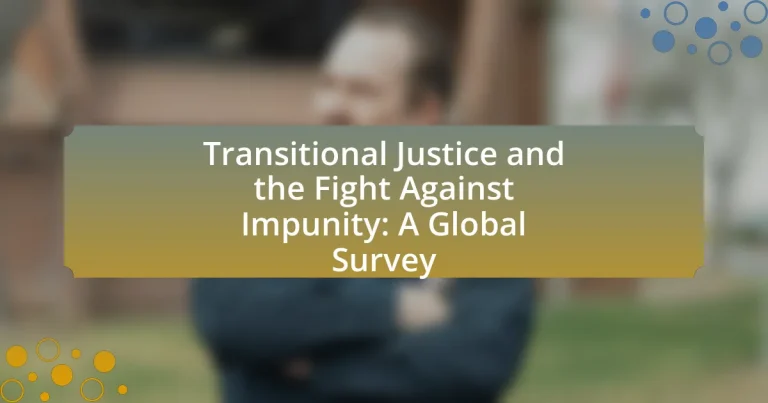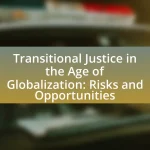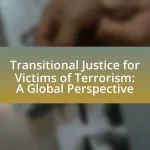Transitional justice encompasses a range of judicial and non-judicial measures aimed at addressing human rights abuses and fostering accountability, truth, and reconciliation in societies emerging from conflict or authoritarian regimes. This article explores the significance of transitional justice in combating impunity, detailing its global definition, key principles, and mechanisms such as truth commissions and criminal prosecutions. It examines the challenges faced in implementing these measures, the impact of political contexts, and the role of public perception in their success. Additionally, the article highlights successful examples of transitional justice, particularly in South Africa and Rwanda, while discussing the unique challenges faced by different regions, particularly in Africa and Latin America.
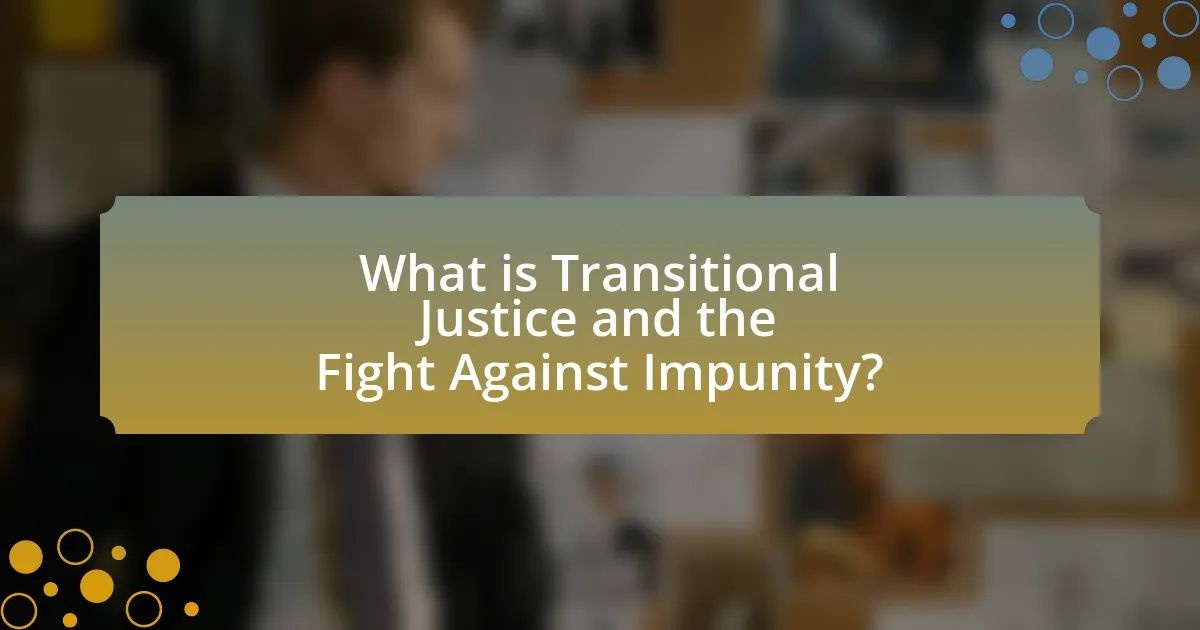
What is Transitional Justice and the Fight Against Impunity?
Transitional justice refers to the set of judicial and non-judicial measures implemented to address legacies of human rights abuses and promote accountability, truth, and reconciliation in societies transitioning from conflict or authoritarian rule. The fight against impunity is a critical component of transitional justice, as it seeks to hold perpetrators of serious crimes accountable, thereby deterring future violations and restoring victims’ dignity. For instance, the establishment of truth commissions and international tribunals, such as the International Criminal Court, exemplifies efforts to combat impunity and ensure justice for victims of atrocities.
How is Transitional Justice defined in a global context?
Transitional Justice is defined in a global context as a set of judicial and non-judicial measures implemented to address legacies of human rights abuses and promote accountability, reconciliation, and the rule of law. This concept encompasses various mechanisms, including truth commissions, criminal prosecutions, reparations, and institutional reforms, aimed at ensuring justice for victims and preventing future violations. The United Nations has recognized Transitional Justice as essential for post-conflict recovery, emphasizing its role in fostering sustainable peace and democracy, as outlined in the UN’s 2011 report on the Rule of Law and Transitional Justice in Conflict and Post-Conflict Societies.
What are the key principles of Transitional Justice?
The key principles of Transitional Justice include accountability, truth-seeking, reparations, and institutional reform. Accountability ensures that perpetrators of human rights violations are held responsible, which is essential for restoring trust in the rule of law. Truth-seeking mechanisms, such as truth commissions, aim to uncover the facts about past abuses, providing victims and society with a comprehensive understanding of the events. Reparations involve compensating victims for their suffering, acknowledging their experiences, and promoting healing. Institutional reform focuses on transforming state institutions to prevent future violations, ensuring that justice systems are fair and effective. These principles collectively aim to address past injustices and foster reconciliation in societies transitioning from conflict or authoritarian rule.
How does Transitional Justice differ from traditional justice systems?
Transitional Justice differs from traditional justice systems primarily in its focus on addressing past human rights violations and promoting societal healing in post-conflict or post-authoritarian contexts. Traditional justice systems typically emphasize individual accountability and legal retribution for crimes, often prioritizing punishment over reconciliation. In contrast, Transitional Justice seeks to establish truth, foster reconciliation, and provide reparations to victims, as evidenced by mechanisms such as truth commissions and restorative justice practices implemented in countries like South Africa and Rwanda. These approaches aim to rebuild trust in institutions and promote long-term peace, highlighting the distinct objectives and methodologies of Transitional Justice compared to conventional legal frameworks.
Why is the fight against impunity important in Transitional Justice?
The fight against impunity is crucial in Transitional Justice because it ensures accountability for past atrocities, thereby fostering trust in legal and political systems. By addressing impunity, societies can confront historical injustices, promote healing, and deter future violations. For instance, the International Criminal Court has prosecuted individuals for war crimes, reinforcing the principle that no one is above the law. This accountability is essential for establishing rule of law and preventing recurrence of violence, as evidenced by post-conflict societies that have successfully implemented transitional justice mechanisms, leading to greater stability and reconciliation.
What are the consequences of impunity for societies?
Impunity leads to a breakdown of trust in legal and governmental institutions within societies. When individuals or groups commit crimes without facing consequences, it fosters a culture of lawlessness and encourages further violations. For instance, in countries with high levels of impunity, such as El Salvador, the lack of accountability for violent crimes has resulted in persistent gang violence and a weakened rule of law. This erosion of trust can also lead to social unrest, as communities feel powerless to seek justice or protection. Furthermore, impunity undermines human rights, as victims are denied redress and perpetrators are emboldened, perpetuating cycles of violence and injustice.
How does impunity affect victims and their communities?
Impunity severely undermines the rights and dignity of victims while destabilizing their communities. When perpetrators of crimes, such as human rights violations, are not held accountable, victims experience prolonged trauma and a sense of injustice, which can lead to psychological distress and social fragmentation. Research indicates that communities affected by impunity often face increased violence and a breakdown of trust in institutions, as seen in countries like Guatemala, where lack of accountability for past atrocities has perpetuated cycles of violence and hindered social cohesion. Furthermore, the absence of justice can discourage victims from seeking redress, thereby perpetuating a culture of silence and fear, which further isolates individuals and erodes community resilience.
What are the main mechanisms of Transitional Justice?
The main mechanisms of Transitional Justice include truth commissions, criminal prosecutions, reparations, and institutional reforms. Truth commissions, such as the South African Truth and Reconciliation Commission, aim to uncover the truth about past human rights violations and promote national healing. Criminal prosecutions hold perpetrators accountable, exemplified by the International Criminal Court’s efforts to prosecute war crimes. Reparations provide compensation to victims, as seen in various countries that have implemented financial or symbolic reparations programs. Institutional reforms focus on restructuring governmental and legal systems to prevent future abuses, which is crucial for establishing the rule of law and restoring public trust. These mechanisms collectively address the legacies of conflict and oppression, facilitating societal recovery and justice.
What roles do truth commissions play in Transitional Justice?
Truth commissions play a critical role in Transitional Justice by uncovering the truth about past human rights violations and fostering reconciliation in post-conflict societies. These commissions investigate and document abuses, providing a platform for victims to share their experiences, which helps to validate their suffering and promote healing. For instance, the South African Truth and Reconciliation Commission, established in 1995, revealed extensive human rights violations during apartheid, contributing to national healing and the establishment of a democratic society. By promoting accountability and transparency, truth commissions also deter future violations and support the rule of law, thereby reinforcing the foundations of a just society.
How do trials and prosecutions contribute to the fight against impunity?
Trials and prosecutions are essential mechanisms in the fight against impunity as they hold perpetrators accountable for their actions. By bringing individuals to justice, these legal processes serve to deter future violations and reinforce the rule of law. Historical examples, such as the Nuremberg Trials after World War II, demonstrate how legal accountability can establish precedents for international law and human rights standards. Furthermore, successful prosecutions can provide victims with a sense of closure and recognition, thereby fostering societal healing and reconciliation.
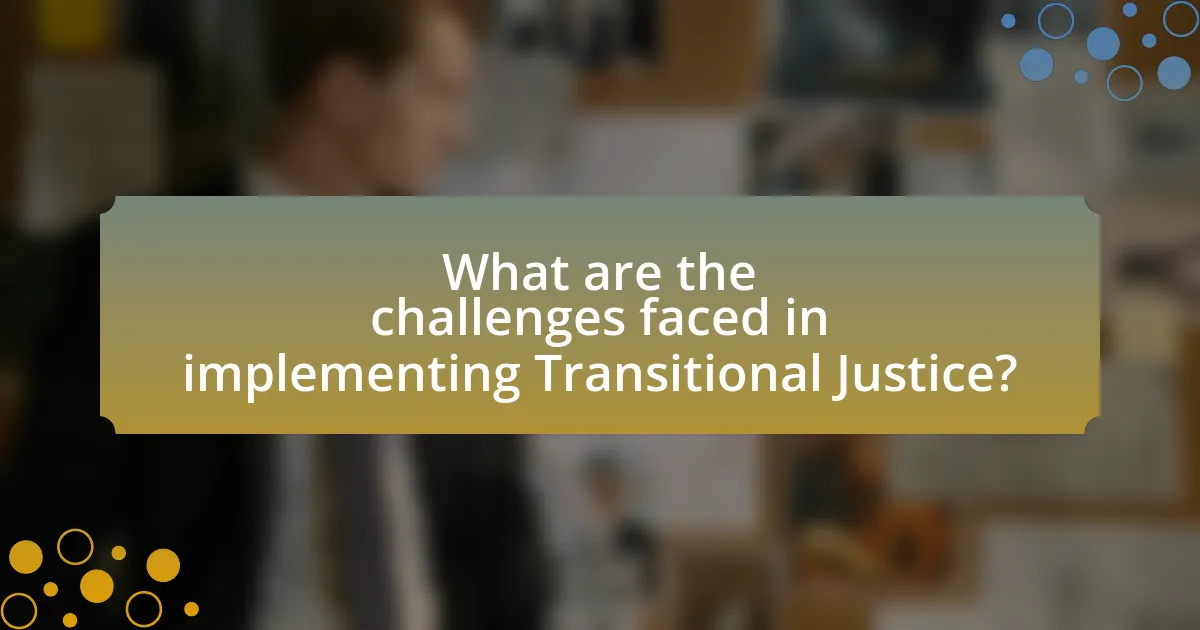
What are the challenges faced in implementing Transitional Justice?
The challenges faced in implementing Transitional Justice include political resistance, lack of resources, and societal divisions. Political resistance often arises from those in power who may fear accountability for past actions, as seen in countries like Syria and Venezuela, where regimes actively obstruct justice efforts. Lack of resources can hinder the establishment of effective mechanisms, such as truth commissions or reparations programs, which require funding and trained personnel. Societal divisions, often exacerbated by past conflicts, can lead to a lack of consensus on the need for justice, as observed in post-apartheid South Africa, where differing views on reconciliation and accountability complicate the process. These challenges collectively impede the effectiveness and sustainability of Transitional Justice initiatives.
What obstacles hinder the effectiveness of Transitional Justice mechanisms?
Obstacles that hinder the effectiveness of Transitional Justice mechanisms include lack of political will, insufficient resources, and societal divisions. Political will is crucial, as governments may resist accountability measures due to fear of repercussions or loss of power, undermining the implementation of justice initiatives. Insufficient resources, both financial and human, limit the capacity of institutions to carry out investigations, prosecutions, and reparations effectively. Societal divisions, often stemming from historical grievances, can lead to resistance against transitional justice processes, as different groups may have conflicting narratives and interests, making consensus difficult. These factors collectively impede the ability of Transitional Justice mechanisms to achieve their goals of accountability, reconciliation, and healing.
How do political contexts impact Transitional Justice efforts?
Political contexts significantly impact Transitional Justice efforts by influencing the willingness of governments to engage in accountability measures and the overall public support for such initiatives. For instance, in post-conflict societies where political leaders are implicated in human rights abuses, there is often resistance to implementing Transitional Justice mechanisms due to fears of political repercussions or loss of power. A study by the International Center for Transitional Justice highlights that in countries like Argentina and South Africa, political will was crucial for the establishment of truth commissions and reparations programs, demonstrating that supportive political environments can facilitate successful Transitional Justice processes. Conversely, in authoritarian regimes, such as Syria, the lack of political will and ongoing repression severely hampers any efforts toward justice and accountability, illustrating how adverse political contexts can obstruct Transitional Justice initiatives.
What role does public perception play in the success of Transitional Justice?
Public perception is crucial for the success of Transitional Justice, as it influences the legitimacy and effectiveness of justice mechanisms. When the public supports Transitional Justice initiatives, it fosters trust in institutions and encourages participation in processes such as truth commissions and reparations. For instance, in South Africa, widespread public support for the Truth and Reconciliation Commission contributed to its perceived legitimacy, facilitating national healing and reconciliation. Conversely, negative public perception can undermine these efforts, leading to resistance and a lack of cooperation, as seen in some post-conflict societies where skepticism about justice processes persists. Thus, public perception directly impacts the overall success and sustainability of Transitional Justice initiatives.
Why do some countries struggle with the fight against impunity?
Some countries struggle with the fight against impunity due to weak legal institutions and lack of political will. In many cases, governments may prioritize stability over accountability, leading to insufficient enforcement of laws against human rights violations. For instance, according to the Global Impunity Index, countries like Mexico and Colombia face challenges in prosecuting crimes due to corruption within law enforcement and judiciary systems. Additionally, societal factors such as fear of retaliation and a culture of silence can further inhibit efforts to hold perpetrators accountable.
What are the implications of weak legal frameworks on impunity?
Weak legal frameworks significantly contribute to impunity by failing to hold perpetrators accountable for crimes. This lack of accountability allows individuals and groups to commit violations without fear of legal repercussions, thereby perpetuating a cycle of violence and injustice. For instance, in countries with weak judicial systems, such as Somalia and Afghanistan, high rates of human rights abuses occur alongside minimal prosecution of offenders, illustrating the direct correlation between ineffective legal structures and the prevalence of impunity. Furthermore, weak legal frameworks often result in a lack of trust in institutions, leading to diminished public confidence in the rule of law and further entrenching a culture of impunity.
How does corruption affect Transitional Justice processes?
Corruption significantly undermines Transitional Justice processes by eroding public trust and obstructing accountability mechanisms. When corruption infiltrates these processes, it can lead to biased investigations, selective prosecutions, and the manipulation of evidence, ultimately hindering the pursuit of justice for victims of human rights violations. For instance, in countries like Guatemala, corruption has been linked to the failure of judicial systems to effectively address past atrocities, as highlighted in the International Commission against Impunity in Guatemala’s findings. This demonstrates that corruption not only impedes the effectiveness of Transitional Justice but also perpetuates a cycle of impunity, making it difficult to achieve lasting peace and reconciliation.
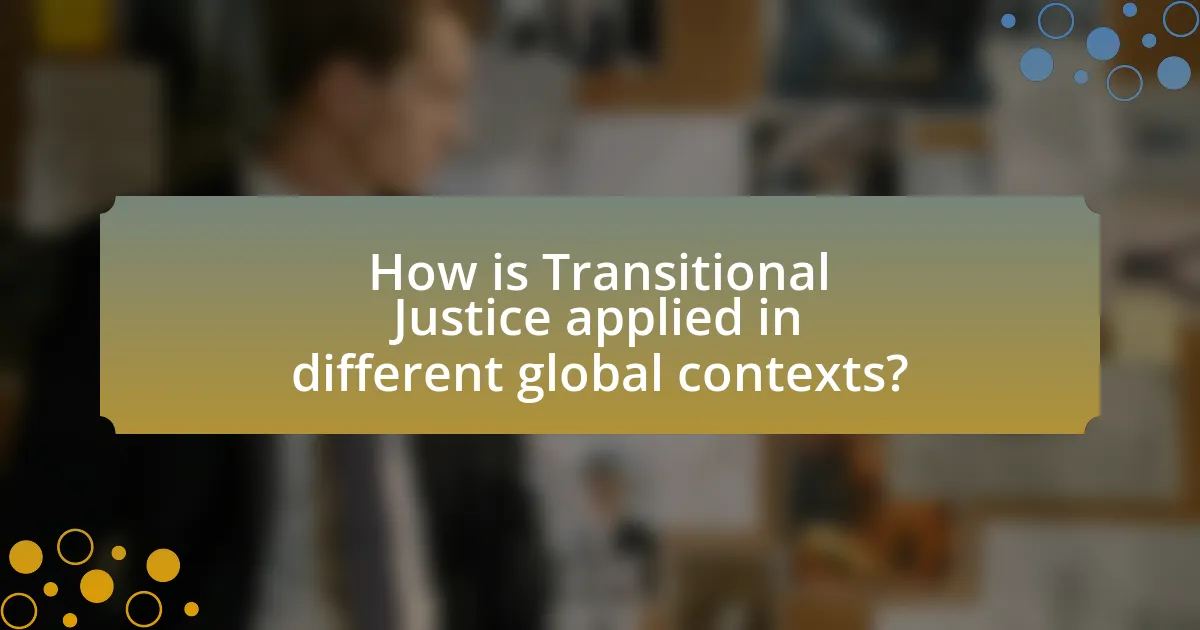
How is Transitional Justice applied in different global contexts?
Transitional Justice is applied in various global contexts through mechanisms such as truth commissions, reparations, and criminal prosecutions aimed at addressing past human rights violations. For instance, in South Africa, the Truth and Reconciliation Commission facilitated dialogue and acknowledgment of apartheid-era atrocities, promoting national healing. In Rwanda, post-genocide justice involved both national courts and the Gacaca community courts, which aimed to address the massive scale of violence while fostering community reconciliation. Additionally, in countries like Colombia, the peace agreement with FARC included provisions for transitional justice, emphasizing accountability and victim reparations. These examples illustrate how transitional justice adapts to specific historical and cultural contexts, aiming to restore dignity and promote rule of law while addressing the legacies of violence and oppression.
What are some successful examples of Transitional Justice?
Successful examples of Transitional Justice include South Africa’s Truth and Reconciliation Commission (TRC), which addressed human rights violations during apartheid, and the International Criminal Tribunal for the former Yugoslavia (ICTY), which prosecuted war crimes following the Balkan conflicts. The TRC, established in 1995, facilitated public testimonies and aimed to promote national healing, resulting in over 7,000 statements from victims and perpetrators. The ICTY, operational from 1993 to 2017, successfully indicted 161 individuals, including high-ranking officials, thereby reinforcing accountability and establishing legal precedents for international law. These cases demonstrate effective mechanisms for addressing past injustices and fostering societal reconciliation.
How did South Africa’s Truth and Reconciliation Commission operate?
South Africa’s Truth and Reconciliation Commission (TRC) operated as a restorative justice body established in 1995 to address the human rights violations that occurred during apartheid. The TRC facilitated public hearings where victims and perpetrators could share their experiences, aiming to promote national healing and reconciliation. It operated under the Promotion of National Unity and Reconciliation Act, which provided a framework for granting amnesty to individuals who fully disclosed their involvement in politically motivated crimes. The commission’s findings were documented in a series of reports that detailed the extent of human rights abuses, contributing to a historical record and fostering accountability. The TRC’s approach emphasized truth-telling as a means to acknowledge suffering and promote societal healing, making it a significant model for transitional justice worldwide.
What lessons can be learned from the experiences of Rwanda?
The experiences of Rwanda teach critical lessons about the importance of transitional justice in post-conflict societies. Rwanda’s genocide in 1994 resulted in the deaths of approximately 800,000 people, highlighting the need for accountability and reconciliation to prevent future atrocities. The establishment of the Gacaca courts, which aimed to address the crimes committed during the genocide, demonstrates how community-based justice can facilitate healing and restore social order. These courts processed over 1.9 million cases, emphasizing the role of local participation in justice processes. Furthermore, Rwanda’s focus on national unity and reconciliation, through initiatives like the National Unity and Reconciliation Commission, illustrates the necessity of fostering a collective identity to overcome divisions. These lessons underscore that effective transitional justice requires a combination of accountability, community involvement, and efforts to promote social cohesion.
What are the unique challenges faced by specific regions in implementing Transitional Justice?
Specific regions face unique challenges in implementing Transitional Justice, including political instability, lack of resources, and societal divisions. For instance, in post-conflict countries like Syria, ongoing violence and authoritarian governance hinder the establishment of accountability mechanisms. In Latin America, historical impunity and entrenched power structures obstruct efforts to address past human rights violations, as seen in Argentina’s struggle with military dictatorship legacies. Additionally, in regions with ethnic tensions, such as Rwanda, the challenge lies in reconciling communities while addressing grievances from the genocide. These factors illustrate the complex landscape that Transitional Justice must navigate in different contexts.
How do cultural factors influence Transitional Justice in Latin America?
Cultural factors significantly influence Transitional Justice in Latin America by shaping societal perceptions of justice, memory, and reconciliation. In many Latin American countries, collective memory and cultural narratives surrounding past human rights abuses inform public demand for accountability and truth-telling. For instance, the role of indigenous cultures and their emphasis on communal healing can affect the design and implementation of transitional justice mechanisms, as seen in countries like Guatemala, where indigenous communities advocate for their rights and historical recognition. Additionally, cultural stigmas surrounding violence and trauma can either hinder or facilitate the acceptance of transitional justice processes, impacting their effectiveness. The interplay of these cultural elements is evident in the varying degrees of success and public support for transitional justice initiatives across the region, highlighting the necessity of culturally sensitive approaches to address historical grievances and promote social cohesion.
What specific issues arise in post-conflict societies in Africa?
Post-conflict societies in Africa face several specific issues, including political instability, economic challenges, social fragmentation, and the need for reconciliation. Political instability often arises from power struggles among former combatants and the lack of effective governance structures, as seen in countries like South Sudan, where ongoing conflicts hinder the establishment of a stable government. Economic challenges manifest through the destruction of infrastructure and loss of livelihoods, leading to high unemployment rates and poverty, as evidenced by the economic collapse in the Democratic Republic of the Congo post-conflict. Social fragmentation occurs due to ethnic tensions and mistrust among communities, complicating efforts for national unity and healing. Additionally, the need for reconciliation is critical, as societies must address past atrocities and ensure accountability to prevent future violence, a process highlighted in the Truth and Reconciliation Commission in South Africa. These interconnected issues significantly impede the recovery and development of post-conflict societies in Africa.
What best practices can enhance the effectiveness of Transitional Justice initiatives?
Best practices that can enhance the effectiveness of Transitional Justice initiatives include ensuring local community involvement, establishing clear legal frameworks, and promoting victim-centered approaches. Local community involvement fosters trust and legitimacy, as seen in South Africa’s Truth and Reconciliation Commission, which engaged communities in the reconciliation process. Clear legal frameworks provide the necessary guidelines for accountability and justice, exemplified by the establishment of the International Criminal Court, which has set precedents for prosecuting war crimes. Victim-centered approaches prioritize the needs and voices of victims, as demonstrated in the case of Colombia, where restorative justice practices have been integrated to address the harm suffered by victims. These practices collectively contribute to more effective and sustainable Transitional Justice outcomes.
How can community involvement improve Transitional Justice outcomes?
Community involvement can significantly improve Transitional Justice outcomes by fostering trust, enhancing legitimacy, and ensuring that the processes reflect the needs and perspectives of affected populations. Engaging communities allows for the incorporation of local knowledge and cultural contexts, which can lead to more effective and relevant justice mechanisms. For instance, studies have shown that when communities participate in truth commissions, the resulting reports are more comprehensive and resonate better with the public, leading to higher acceptance and implementation rates. Additionally, community involvement can facilitate healing and reconciliation by empowering victims and promoting dialogue, which is essential for sustainable peace.
What role does international support play in successful Transitional Justice efforts?
International support is crucial for successful Transitional Justice efforts as it provides resources, expertise, and legitimacy to local initiatives. This support can enhance the capacity of domestic institutions to address past human rights violations effectively. For instance, international organizations like the United Nations have facilitated numerous transitional justice processes, such as in South Africa and Rwanda, by offering technical assistance and funding. Additionally, international backing can help ensure accountability by pressuring local governments to adhere to justice mechanisms, as seen in the International Criminal Court’s involvement in various cases. Thus, international support not only strengthens the operational framework of transitional justice but also fosters a culture of accountability and reconciliation.
